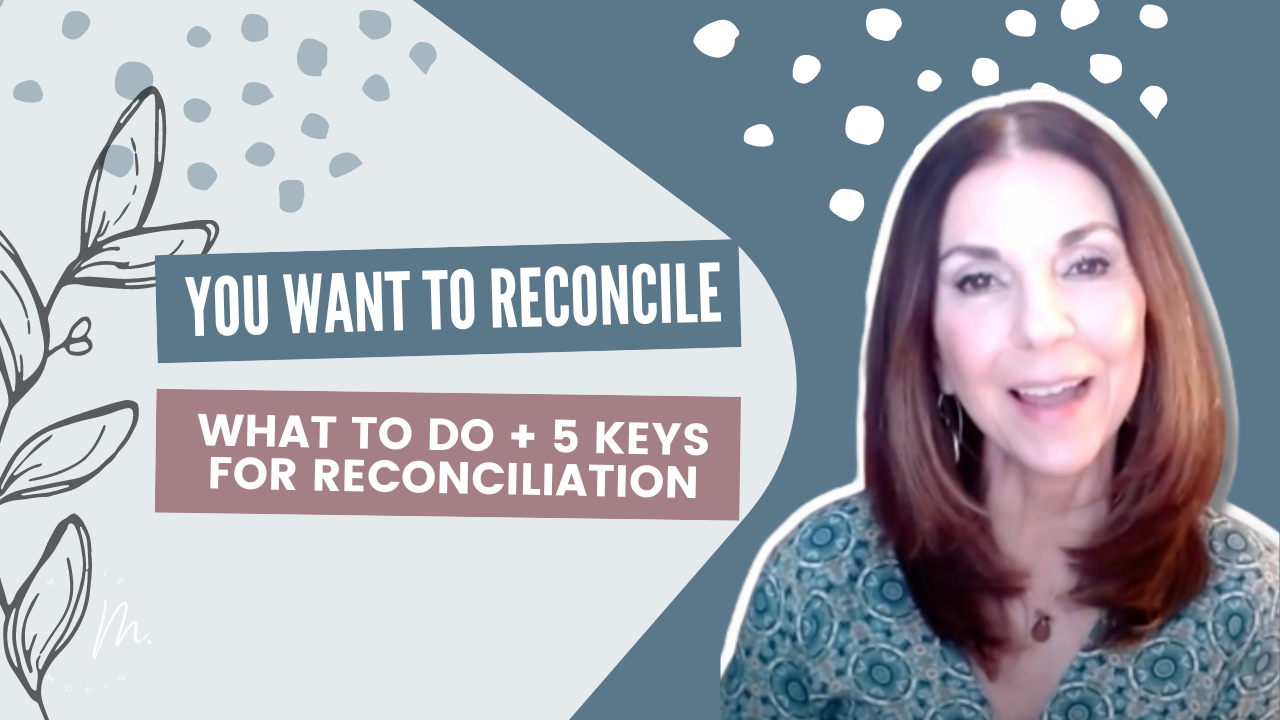Estrangement is troublesome, and reconciliation might feel impossible. In some cases, it is possible to reconnect with your adult child; in others, it might not. Having the right tools to guide you through your attempts at reconnecting will serve you better than going cold.
What To Do When You Want To Reconcile (5 Keys When Hoping For Reconciliation)
1. Examine Your Expectations
It may be possible to reconnect right now, or it might not be. It’s dependent on the various circumstances of your situation. Learning to examine your expectations will help you to accept the situation, whatever the outcome is.
It’s important to understand that reconciliation cannot be rooted in fairness due to the imbalanced evaluations in a parent/child relationship. For the majority, reconciling takes time. The average length of estrangement is 4.5 years.
Successful reconcilers understand that expecting the other to agree or fully accept the narrative of the other. The relationship will unlikely return to “normal” after you have resumed contact. Prepare for your attempt to be unsuccessful. It might take more growth and learning for the reconciliation to take hold.
2. Communication Skills
Learning to communicate effectively after a rift with your adult child is a long road. You may have to unlearn some of the ways you speak to strike a different chord within your adult child and move toward the repair.
By practicing conversations you want to initiate, you will prepare for possible bumps in your attempts. Go through more than one scenario and outcome to prepare for your response.
Make sure you express your good intentions with your adult child. A small intro of “I’m doing this because I love you, and I want to repair our relationship” can go a long way. If your adult child has the floor, be sure to listen, validate and remain calm. Do not guilt trip or criticize their point of view.
In his book Rules of Estrangement, Joshua Coleman puts it very clearly: “Learning to communicate in a way that is egalitarian, psychological, and self-aware is essential to a good relationship with your adult child.”
Take note of your body language, and try not to shut down emotionally. If you want your adult child to be open with you, you must remain available to receive.
3. Take Responsibility
When making amends, you must prepare to take responsibility for the ways your child might admit you hurt them. The conversation may not go how you practiced, and you might feel hurt by what they express.
Taking responsibility is the first step in forgiving yourself for your downfalls. Making amends is courageous, and your adult child may respect you more when you can fervently take responsibility for behavior that might have disappointed them.
By taking responsibility and knowing you’ve done everything possible to reconnect, you’re miles closer to self-forgiveness and self-compassion.
4. Be Informed
Having information and remaining educated on estrangement will empower you. Your intentional journey towards your goal of reconciling and finding peace will be easier when you are informed.
Learn about the condition, why adult children cut ties, the best communication skills, how to best care for you, and how to lessen stress. Chronic stress is deeply uncomfortable, making it challenging to deal best with our kids. Empower your journey with information, so you are well prepared.
Estrangement hits at least 27% of individuals in the United States. Your experience can be confusion, disappointment, grief, anxiety, and sadness. Keep reading about other stories of estrangement to gain more insight into the complexities of your condition.
5. Practice Self Care
Indulging in practices that are soothing to your physical body and mind can help you during your attempted reconciliation. By creating a routine for yourself, you can rely on the stability you have made possible. It will empower you to have control over your self-care practices.
Practice calming techniques such as diaphragmatic breathing, do affirmative self-talk and remember to stay social. Remaining in contact with those who love and value you will remind you that moving forward is possible even through intense pain.
If you don’t already have it, get support from a therapist to continue taking care of your mental state. By practicing self-care, you will realize that moving forward for yourself is always possible, no matter the outcome.
Conclusion
Reconciling with your loved one may feel like an enormous feat. With the proper preparation and communication tools, you can begin to repair your relationship. Remember that sometimes, reconciliation will not be possible for you now.
With support from a therapist, you’ll be better equipped to know when the time is right for you to begin your attempt at reconciliation. This article discusses What To Do When you Want To Reconcile (5 Keys When Hoping For Reconciliation).






